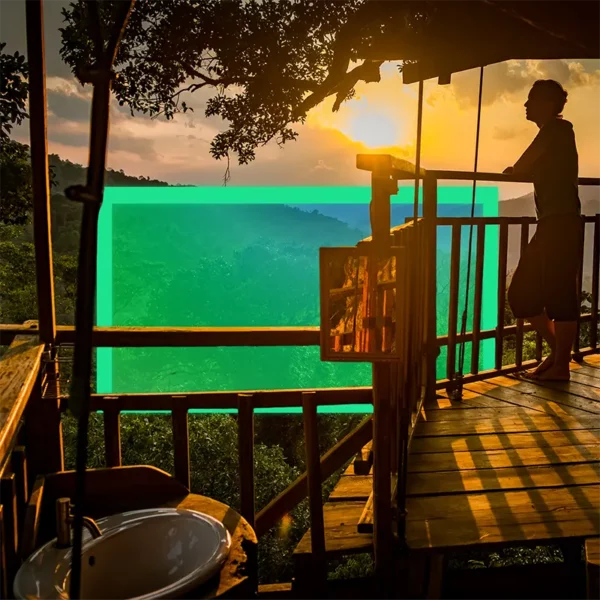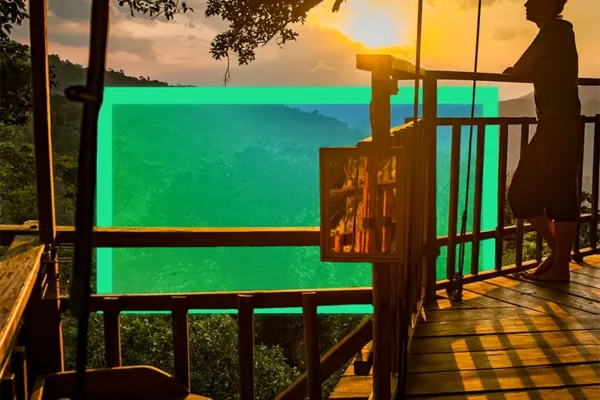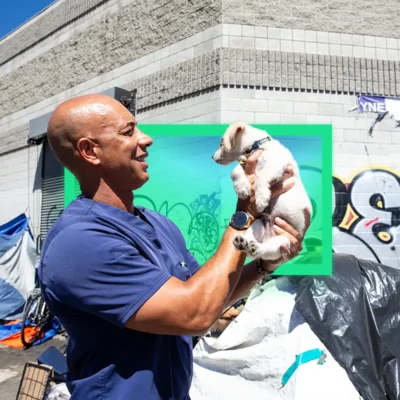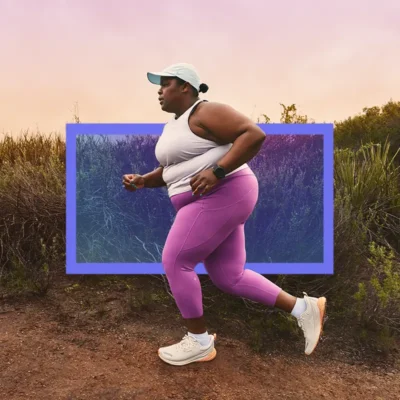There’s beauty in breaking the rules
Growing up in the suburbs of England, Felix Barrett — founder of immersive theater company Punchdrunk — considers himself a good kid. He’s a rule-follower with a deep respect for authority. But a few eye-opening evenings at the theater introduce him to the exciting, and sometimes dangerous, world of rule-breaking. Later, on an unplanned trip to Thailand, Felix learns to embrace a life without rules and finds the beauty that exists in the extreme.


Table of Contents:
Transcript:
There’s beauty in breaking the rules
FELIX BARRETT: I slide the disc into my hi-fi stereo. Gently turn the volume knob to the right. I got the hi-fi with the biggest bass I could. I want to be physically touched, manhandled by the music. I want that visceral pound in my chest. I start to move in the way I saw people move at the show. As I swing my arms and stomp my feet, I see how this music shifts my physical vocabulary. I feel transformed by it.
ROHAN GUNATILLAKE: As the founder of Punchdrunk, most famous for the pioneering theater experience Sleep No More, Felix Barrett knows a thing or two about pushing boundaries and upsetting conventions. In this week’s episode, Felix shares the story of his first experiences breaking the rules and how doing so opens him up to a new world full of danger and beauty.
In this series, we combine immersive first-person stories, breathtaking music, and mindfulness prompts so that we may see our lives reflected back to us in other people’s stories. And that can lead to improvements in our own inner lives.
From WaitWhat, this is Meditative Story. I’m Rohan, and I’ll be your guide.
The body relaxed. The body breathing. Your senses open. Your mind open. Meeting the world.
BARRETT: The rows of seats bend in a large arc around the stage. The space is dark. I sit in the aisle at the back of the auditorium — in the cheap seats. I run my hands along the scratchy, worn fabric of the armrests and swing my legs freely back and forth. I’m 9 years old. Small for my age. My feet barely touch the ground.
It’s my friend Caroline’s birthday. We’re seeing Andrew Lloyd Webber’s musical Cats. Even at this age, I have a very rigid idea of what theater is supposed to be. At a show like this, I expect to see some actors far away under a big arch dressed in furry suits, like Care Bears.
But, on the rounded stage below, I see a set that spills out into the auditorium. Fake piles of rubbish, newspaper, and trash cans nearly overtake the front row. The junkyard at the back of the stage rises up and continues along the bannister of the balcony. I can’t stop looking around. I’m entranced.
The lights dim and the music starts. I sense movement out of the corner of my eye. I turn and see an actor in a full bodysuit. He’s out here. In the audience! With us!
He bounds down the aisle towards the stage. Then abruptly stops. I can’t believe how close he is. His head spins in my direction. I see his face painted in feline features and hooded with fur. He looks straight at me. I freeze.
It’s just a beat of eye contact — half a second. But it feels like something he isn’t supposed to be doing. It’s a slight deviation. It doesn’t feel dangerous. It feels generous. Like he’s paused time for a moment, and given it to me. Suddenly, everything I know about theater is shattered. The performance isn’t confined to the stage. The rules have been broken. There are 1,000 people in this auditorium, but this performer makes space just for me. The littlest person here.
In a flash, the moment is over, the performer moves on. The show surges forward.
At home, I talk about the show endlessly. I relive every detail. Months later, at Christmas, mom gets me the cassette of the Cats soundtrack. Unwrapping it under the Christmas tree in our front room, I weep tears of joy for the first time in my life. The sensation of my moment with the actor is so potent.
Seeing this performer be on their predetermined path but then pause, and break away for a small moment of intimate human connection, it’s thrilling. It’s a breaking of the rules, but I feel the humanity at the core of it — the possibility and beauty. My world begins to open up.
The fabric ceiling of our beige family car, a Vauxhall Astra, has collapsed and drapes down like the inside of a bedouin tent. Like everything we own, it’s dilapidated but loved. I hold the fabric up with one hand to look out the back window. The car pulls into a generic underground car park, and the sudden lack of natural light feels a little haunting.
My parents and I are on our way to a play that we know nothing about. But at 9 years old, I’ve got the theater bug. So when our local theater announces this production, dad books front row tickets.
It’s called The Rocky Horror Show.
The car eases into a parking spot and I see a figure flash by the window. They’re a jumble of goth makeup and black lace. “What was that?” I think. It looked like someone in a Halloween costume. But it’s nowhere near Halloween.
It happens again as we walk from the car to the theater. I see hair ratted out like a big nest and decadent evening underwear with all the gubbins and things. “Oh my gosh, there’s another one.” My eyes go wide. I feel my face flush. My parents have noticed now too. Mom holds my hand tightly and says, “Don’t worry. We’ll be safe in the theater.”
But as we turn the corner, a hoard of creatures is standing before the entrance. People with crazy costumes, garish makeup, wild hair. With sinking dread, we realize they’re all going where we’re going. The safe house of the theater has been infiltrated.
It feels grotesque. It’s unexpected. And unexpected is dangerous.
At home in the suburbs, I’m quite obedient. A rule-follower. Every Sunday, I go to church dutifully with my mother. I learn phrases from the Bible by rote. My school is filled with posters warning us of “Stranger Danger” — the risk that there might be a kidnapper at the end of every dark lane. I learn to fear the unknown. Discipline is drilled into me. I grow to respect hierarchy and systems. If I step out of line, I fear there’ll be repercussions.
Inside the theater with my parents, chaos reigns. Everyone is standing up, hollering, drinking, throwing things. It’s too much. I don’t want to be here. But we grit our teeth. Obviously, once the lights go down, they’ll go quiet.
Then, as the lights dim, a tidal wave of noise roars up. Oh my gosh. It’s even louder! The Usherette character — in her fishnet stockings and caked-on makeup — sings the opening number. The audience yells, laughs, and interacts with the performers.
Quickly, the attention of the room turns to us: Two adults and a 9-year-old boy, dressed in their Sunday best in the front row. I’m panicking. After 10 minutes of sexualized content and being the butt of jokes from the stage, my parents decide, “Okay, we need to evacuate.”
In the safety of the lobby, I can finally breathe. Away from the audience and performers, there’s a semblance of society again. But then, “Oh no.”
I turn to my dad, “My jacket!” We were so flustered leaving the theater that I left it in my seat. My dad looks down at me. He’s an academic. A glorious eccentric — with a big bushy beard he looks like a wild-eyed Santa Claus. But as he bravely turns toward the theater door, heading straight back into the lions’ den, he‘s a knight in shining armor.
The roar of the crowd when he steps back into the auditorium is phenomenal. It’s a sound I will take with me to my grave.
It feels like an epic tale. The seething horde and dad the hero. It’s empowering for us as a family unit. But it’s a bit traumatic too. Everything about it is too much in one direction. Too extreme. Too dangerous. It takes me hours to calm down. Suddenly, finding myself in this world where rules don’t even seem to exist is scary.
GUNATILLAKE: This is a harrowing moment seen through the eyes of a young Felix. How does your body react to the expectations being upended at the Rocky Horror Show? To the rules being broken? Are you cringing, full of anxiety or perhaps excitement, or something else? What can we learn from observing our own reaction to this moment?
BARRETT: The four light switches in my bedroom are each connected to a different colored light bulb: green, red, blue and orange. I have them installed when my parents give me permission to decorate. I also choose to paint the walls black and white. I like having an environment that I can shift to whatever mood I’m in.
I flick the switch for red, and walk to my dresser. I pick up a CD case and see the face on the cover — the shocked expression, hoop earrings, and arched eyebrows. It’s The Rocky Horror Show soundtrack.
I slide the disc into my hi-fi stereo. Gently turn the volume knob to the right. I got the hi-fi with the biggest bass I could. I want to be physically touched, manhandled by the music. I want that visceral pound in my chest.
I feel the grit of it. Guitar. Drums. Screeching choruses. I start to move in the way I saw people move at the show. I hadn’t understood it then. But there’s a power to draw on in that fervor. As I swing my arms and stomp my feet, I see how this music shifts my physical vocabulary. I feel transformed by it.
I obsessively listen to this album in the months after my parents, and I flee that theater. The extreme emotions — which felt so terrifying in that moment — are a feeling I get so rarely in life. I want to amplify them and feel them again.
On that night in the theater, I saw the world as binary — right and wrong, black and white like the walls of my room. Relistening now, I stray to the side of those wild spirits. I’m becoming unspooled. I still fear that I’ll unravel too far. But in the safety of my room, that danger I experienced becomes a thing of wonder. Those shades of gray become a space to have fun.
I fantasize about playing Dr. Frank-N-Furter — that terrifying and alluring character. I imagine shocking my classmates and friends. It’s exciting to see my horizons spill out and stretch to the extremes of life. Now that I know there’s something there — a little door to another world — I feel empowered to go towards it. To break the rules, diverge from the expected, and unearth the beauty that lies alongside the danger.
The first real chance I get to forge a new path comes after I finish secondary school. I’m 19 and want to make a film — a music video for a song, “Loving you More,” by BT. It makes me feel a particular way. The musicality in the bridge shifts from euphoria to threat. I want to make other people feel that too.
I’m expected to start university in a year. It’s the next step in my journey towards adulthood. I don’t go to church anymore, but I’ve absorbed the attitudes and discipline from my British, Christian upbringing. I know that good grades lead to a good job and a wholesome life.
Knowing this gives me the strange feeling that time is running out. Like I have this one opportunity to try something different, something a little dangerous, something off the rails of normal life.
For six months, I beg, borrow, and steal whatever I can for a two-day shoot. I hire actors ten years older than me. I build a set in my Granny’s house and cover every inch with postcards from the National Portrait Gallery. The face of a forgotten actor from the 50’s stares at me, repeating a thousand times over.
The day of the shoot finally comes and I get a phone call. The man on the end of the line tells me, “Sorry, James Bond is shooting and they need a spare camera. So you can’t have the one you rented.”
Six months of work dies in a day.
Standing in my grandmother’s house, eyes peering at me from the postcards that fill the walls, I get a real, adult-scale bollocking from one of the actors. “I knew you couldn’t do it you little shit,” he yells.
In my head I think, “Of course I couldn’t. Why did I even try? I strayed too far off the path.” I feel myself shrinking down, like I’m standing before the headmistress at school. But it’s more than just shame. It’s like that different future I imagined for myself is crumbling around me. The pathway that diverged from the standard path is closed. Now what?
My friends are taking a gap year to travel before going to university. To some, that probably sounds like an adventure, but it’s the expected thing to do for someone my age who can afford it. Where they plan to go in Thailand is the definition of the well-worn path. It’s touristy. On rails. Halfway around the world and filled with loads of Brits from London.
I hadn’t wanted to do what was expected. I wanted to use this precious time to explore and push boundaries. Create new worlds and embrace the beauty and danger that may exist there. That’s over now. So, tail between my legs, I go back to following the rules. I bite the bullet and go with them.
The hostel is really hot. Sweat lingers on my forehead and drips down my back. We’re in the cheapest room that money can buy. Simple. Just two cots. My friend returns from a tense phone call with his girlfriend.
He turns to me and says, “I’ve got to go home tomorrow.” A wave of panic washes over me.
“My flight’s not for another week!” I say. “What am I going to do?”
So far, nothing about Thailand has felt dangerous. I’ve been passive. Shuttled around from place to place. But this is a twist.
Watching my friend hastily pack his bag, I realize I have a decision to make. For most of my life, outside influences and authority figures have dictated what I do. But here, it’s just me. No one is going to help.
I’m standing at a metaphorical fork in the road. I can either go home early, cancel the rest of this trip, and once again do the expected, safe thing. Or I can stay, and choose an unexpected path.
That’s exciting. And scary. I’d be alone in a foreign country where I don’t speak the language. This is well before cell phones. If something were to happen, how would my family find out?
My friend turns to me, dismayed. “Sorry you have to cut your trip short, mate.”
I feel a sensation rise up in my chest. The sense that I’m flirting with something outside the bounds. Something a little dangerous and against the rules. “No, it’s alright,” I tell him. “I’m going to stay.”
GUNATILLAKE: For Felix, doing what’s expected feels like a failure. It lacks the danger he so craves. Take a moment to reflect on your own relationship to following rules. Do rules provide comfort for you? Or do you bristle at them being imposed? Notice how your body feels when reflecting in this way. It may provide a clue.
BARRETT: After seeing my friend off at the airport, I travel 24 hours back to an island we visited before. It’s tiny, with a little lagoon at the center. There are no motor vehicles. You can only access it by boat. The quintessential desert island.
I get the cheapest room I can, which is in a treehouse. The entrance is up a set of stairs that wraps around a massive trunk. Once inside, I can see through the floorboards of the makeshift rooms. The bathroom is rudimentary. The ceiling fan rickety. All night long, I hear a patter above me, as big rats run up and down the ceiling beams.
The beach near my treehouse is flanked by two skyscraper-high rocky outcrops. It’s the perfect theatrical frame. Like the proscenium arch above a theater stage. The sand is silky smooth and white. And the infinite flat ocean is a pearlescent green against the beautiful blue sky.
It is magical.
A week later, it’s time to fly home. I have a ticket. I have an obligation to be there. But then I think, do I? Says who? I have five months until I start Uni. Why not spend it here? I start to have the courage to write my own rules, regardless of the repercussions.
I get a job at a local bar and live off the free lunch in the kitchen. On my first day, the chef, Ray Watt, cooks up his staple fish curry. My first mouthful is absolutely delicious for about half a second. And then the heat hits. My nose starts pouring. I have a weird, almost asthmatic attack. The feeling is extreme, almost too much. But I come back, again and again.
The weeks roll by. I work at the bar. I take little adventures into the jungle. I earn pennies, but manage to scrape by.
On my last day before returning to England, I decide to climb the higher of the two outcrops that flank my beach. It’s risky. The surface is jagged. The rocks are like razor blades, broken by the waves and the wind. I start to climb, hand over hand, finding my footing with bare feet. And then, I slip and tear a chunk of flesh out of my knee. It occurs to me that you’re probably not supposed to do this.
But, as I scramble my way onto the outcrop’s flat top, I look down at the island below me. This beautiful, pristine place.
Lying underneath the vast sky, hearing the waves crash far beneath me, I have the sense of being at the highest point in the middle of the ocean. The danger is subsumed by the beauty of it.
Since I was a kid, I’ve been attracted to these extreme experiences — extreme joy, extreme fear, extreme wonder. But I always sensed the danger of stepping out of line. I think back to my film project that failed. The humiliation. How I doubted myself. How I thought a life of experimentation would never be for me.
And yet, here in Thailand, straying so far off the beaten path, I don’t feel afraid. I feel empowered. The sense of being on my own rails is potent. I don’t need to answer to anyone. I don’t need obedience. I can just be myself.
When I return home, this feeling stays with me. I’m tanned and weather beaten. I’m nothing but skin and bones. But I’m more alive than I’ve ever felt before.
And I’m laser focused on what I want to do: Take risks, make mistakes, and break the rules. Not just for the sake of breaking rules. But to make my own choices, open new and mysterious doors. And show those doors to other people, too. Create spaces where they can feel what I feel. Where they can be disobedient. See their own horizon spill out and expand.
Breaking the rules and diverging from the expected can be empowering, because it opens us up to worlds we didn’t know existed. When you live life at the edges, there are always dangers, but there are also things of absolute beauty to see.
Rohan’s closing meditation
GUNATILLAKE: Thank you Felix.
In one of my previous lives I worked in innovation in the arts in London, and so am very familiar with Felix’s creative work through Punchdrunk — the theater company he founded. The show I remember most vividly was one called “The Drowned Man.” It was 10 years ago now. Located in a disused postal sorting office in central London, the space was transformed into a ‘60s film set, and I remember exploring the space — and the story — in a bit of a haze. I discovered secrets, I got caught up in crowds, I got lost. I lived a whole universe in one evening. So it was so special for me to hear Felix talk about his origin story — the experiences that paved the way to the incredible creative work that he leads today. I genuinely think there are few people alive right now that have had the influence he has had in storytelling — be that in theater, in games, in podcasts, and elsewhere.
Yeah okay, I am a fanboy, but is that such a crime?!
Felix’s story is about what happens when rules are broken, so of course that is what our closing meditation together will be inspired by.
And we’ll start in the most comfort-zone of meditations: by following our breath.
Inviting the body to be comfortable.
Yes it will carry some tension and some of the stories of the day just gone. That’s okay.
We can shuffle or soften the body how we care to — whatever we need to feel that little bit more comfortable.
Inviting the breath to be comfortable.
Not looking to change it in any way, what we will do is attach our attention to it.
Dropping our attention onto our breath, like a tag on a whale.
The whale, the breath, able to do its own thing, follow its own path.
And all the time our attention, our tag, is there, knowing where it is, knowing how it is.
Aware of the movements of the breath.
Aware of the patterns of the breath.
Resting our awareness with the breath and its detail, and when we notice the mind hopping away, as it will do, gently coming back, again and again.
So, this is one of the most classic, most conventional meditation practices there is.
It’s a good one, a great one, to really get to know well.
But right now how about instead we break the rules?
The rule in breath-based meditation is to pay attention to the breath.
So now, my invitation to you is to pay attention to everything apart from the breath.
The breath now is forbidden; everything else instead becomes the playground for our attention.
With our body relaxed and our intention clear.
We are interested and alert — aware of the anti-breath, the not-breath, everything but the breath.
Taking that instruction and exploring what it is like to practice in this way.
Aware of the not breath.
And as always, perhaps more interested in how our mind reacts in response to an experience or an instruction than trying to get it ‘perfect’ each time.
In Felix’s story, we hear about what happens when we break the rules ourselves. We also hear about what can happen when the rules are broken around us.
So, thank you Felix.
And thank you.
“Hey Dorothy, how was that?”
“Yeah, I really enjoyed that. I actually met Felix Barrett a couple of times back in London. As you’d expect, he’s a really great guy.”
“Sort of gentle, but at the same time, full of intense energy, full of ideas, bang bang bang, and just so interested in everything you’re doing. Just a really, really amazing guy.”
“No, I never actually saw Sleep No More. I think I left London before I got the chance, or maybe after I left, I’m not 100% sure. But the thing that always gets me with Punchdrunk’s work is just how intricate it is. It’s like a treasure map, just a landscape constantly surprising. And there’s something about, you know, as an audience member, you’ve got to wear a mask. There’s something really there’s something about that.”
“No, not really doing much this weekend. It’s been a busy few weeks since Easter, and we’re going down to London next weekend for the coronation actually, King Charles’ coronation. I thought we’d go down to see my mum and see what’s happening. Yeah, my mum’s like, cause my mum cued for 10 hours to see the Queen’s casket.”
“Yeah, great to see you both too and see you next week.”
Dear listener, dear friend, did you notice how your mind moved just now as you were wondering what was happening just there?
Thank you Felix. For your work, your inspiration to me in the past, and your inspiration today to take a risk of my own.
And thank you. Go well.
We’d love to hear your personal reflections from Felix’s episode. How did you relate to his story? You can find us on all your social media platforms through our handle @MeditativeStory, or you can email us at: [email protected].





